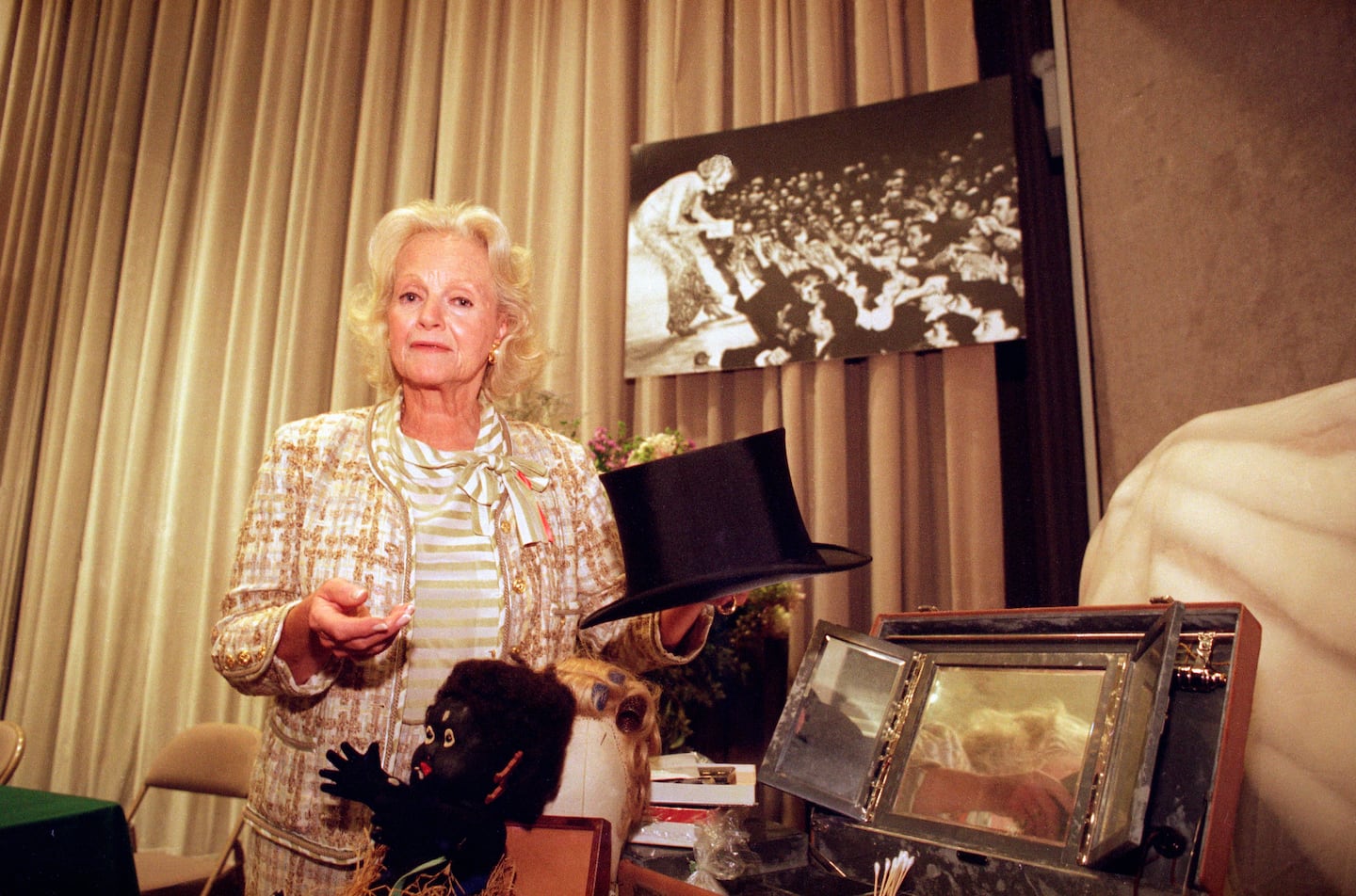Copyright The Boston Globe

Ms. Riva had grown up on Hollywood film sets and was, by her own description, a shy and uncomely child who was at once dazzled and dominated by her emotionally withholding mother. Years later, she reflected that Dietrich’s beauty and cool poise masked an insatiable need for worship, whether from a rotating cast of male and female lovers, the ticket-buying public, or her family. “We worked as a royal court,” Ms. Riva told an interviewer. “Dietrich was the queen. My father was her majordomo. Her lovers were her courtiers. And I was her lady-in-waiting.” Dietrich was the subject of many books, including her markedly unreliable memoir, but few volumes landed as powerfully and disturbingly as Ms. Riva’s biography, “Marlene Dietrich,” published in 1993, the year after her mother’s death at 90. The alternately sympathetic and astringent portrait of her mother was a bestseller, and film critic Molly Haskell, in a New York Times review, called it “a startling and riveting work.” The protégé of filmmaker Josef von Sternberg, Dietrich became a global sensation as a coldhearted cabaret temptress in his German-language film “The Blue Angel” (1930). Under his later direction in Hollywood, she secured her mystique as a goddess of desire in a run of highly stylized movies that accented her celebrated legs, cavernous cheekbones, pencil-thin arched brows, and languid blue eyes. Dietrich was depicted as seductive even in - especially in - men’s trousers or a tuxedo, becoming a boundary-breaking femme fatale whose androgynous and mysterious European sex appeal inspired legions of imitators, including Madeline Kahn and Madonna. After her movie career slowed in the 1950s, Dietrich spent decades touring in a one-woman stage show, draped in furs and jewels and reprising signature numbers such as “Falling in Love Again,” “Lili Marlene,” and “La Vie en Rose.” Ms. Riva described the Prussian discipline that Dietrich brought to her craft, her eye for the smallest shadow or imperfection that could be picked up by a camera lens, and an intellect so sharp that author Ernest Hemingway asked for her opinion of his early story drafts. She told how the outspokenly anti-Nazi Dietrich renounced her German citizenship to become an American and trekked to the front lines of Europe to entertain Allied troops during World War II. But, with access to lurid diaries that Dietrich had denied keeping, Ms. Riva also presented her mother as inexhaustible in sex as well as work and seemingly incapable of self-reflection. Dietrich was, ultimately, a tragic figure, Ms. Riva wrote, corroded by vanity, self-absorption, and betrayal, entrapped by dependencies on alcohol and a pharmacopoeia of drugs as she strove to maintain her allure well into her 70s. Reflecting on her own upbringing, Ms. Riva recalled a life of wonder against the backdrop of the Depression, including first-class travel on luxury ocean liners and suites at the grand hotels of New York, London, and Paris. At 9, she played the young Catherine the Great (embodied as an adult by her mother) in von Sternberg’s “The Scarlet Empress” (1934). The excitement of those experiences was offset by what Ms. Riva perceived as her mother’s callous indifference to her well-being. To protect Dietrich’s image of youth, Ms. Riva’s true age was shrouded - even from her - for much of her childhood. She was denied friends and a formal education to keep her at her mother’s constant beck and call. Ms. Riva said her mother manufactured displays of maternal love for the benefit of photographers. In private, Dietrich once berated her daughter for having ruined her breasts by nursing too hard as a baby. In her most incendiary accusation, Ms. Riva wrote that just as she started to show interest in boys as an adolescent, her mother arranged for her to be raped by a lesbian governess. Dietrich “maneuvered my sexual abuse,” Ms. Riva wrote, in the hope that she would lose interest in men, remain “unencumbered” by family obligations and, thus, be available to serve her mother’s needs in perpetuity. Ms. Riva said the sexual abuse continued for 18 months, fueled her alcoholism during her teen years, and propelled her into a disastrous first marriage to escape her mother’s grip. The biography, she said, was an attempt to reveal not only the complexities of her mother but also the ways in which people with extraordinary beauty or wealth often use those advantages to hurt others. “Power must not be allowed to triumph all the time,” she declared in an interview for the Television Academy Foundation in 2009. “It mustn’t be forgiven no matter what it does because it’s beautiful, because it’s famous, because it’s powerful.” Maria Elizabeth Sieber was born in Berlin on Dec. 13, 1924. Her father, Rudolf, was an assistant film director with whom Dietrich, then trying to break into movies as an extra, had become briefly infatuated. Ms. Riva observed that her mother craved romantic adoration but detested the consummation of love - repeatedly telling her daughter that it was an “inescapable burden” of womanhood. Dietrich preferred being wooed by impotent men, explaining to her daughter: “They are nice. You can sleep, and it’s cozy!” Dietrich’s marriage to Sieber, which continued until his death in 1976, was decidedly unconventional. Dietrich would send him the letters she received from her lovers. Complicating the domestic scene was Sieber’s live-in lover, a Russian refugee named Tamara “Tami” Matul. She was also Dietrich’s cook and maid and, at times, a surrogate mother to Ms. Riva. Ms. Riva wrote that Sieber and Dietrich forced Matul to undergo 15 abortions - “to ensure no scandal sullied the purity of my mother’s marriage.” Matul suffered a mental decline and eventually died in an asylum. Sieber spent his later years as a chicken farmer in California’s San Fernando Valley. After her own early and short-lived marriage, in 1943, to actor Dean Goodman, Ms. Riva left California for stage roles in New York and a long USO tour to entertain American service members in Europe. By then an elegant young woman, she had a promising but brief acting career in the 1950s on CBS anthology series such as “Studio One” and “Suspense.” In 1947, she married William Riva, a scene designer for stage and TV. Their marriage lasted until his death in 1999. Their eldest son, J. Michael Riva, an Oscar-nominated production designer, died in 2012. In addition to her son Peter, she leaves two sons, Paul and David; seven grandchildren; and a great-granddaughter. When Ms. Riva’s first son was born in 1948, a Life magazine cover story proclaimed Dietrich the world’s most glamorous grandmother. But, according to Ms. Riva, Dietrich privately blamed her for having “complicated” her life by making her seem old. She compensated by plunging into more affairs, with Yul Brynner, Edward R. Murrow, Frank Sinatra, and President Kennedy, among others, according to her daughter. Ms. Riva left acting because its demands were not conducive to the family life she desperately wanted. But she wrote that she was gradually drawn back into her mother’s orbit as caretaker, functioning as “peacemaker between the outrageously difficult star and her suffering minions” on sets from Las Vegas to London. Eventually, the star’s legs deteriorated to the point that she could no longer walk. Dietrich spent her final years bedridden in Paris, bitterly claiming in her diary that her family had abandoned her. In 1993, after the release of her book, Ms. Riva acknowledged that many Dietrich fans would find ways to reconcile her graphic account with their memories of her mother as she had once been on-screen. She had no doubt the celluloid illusion would hold.



